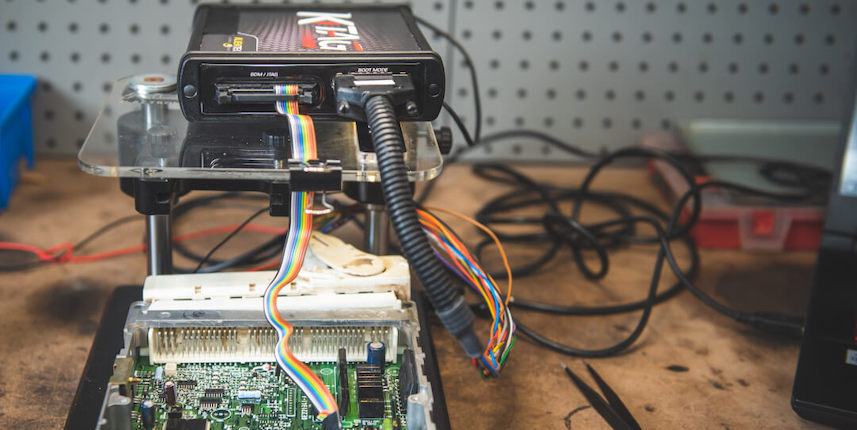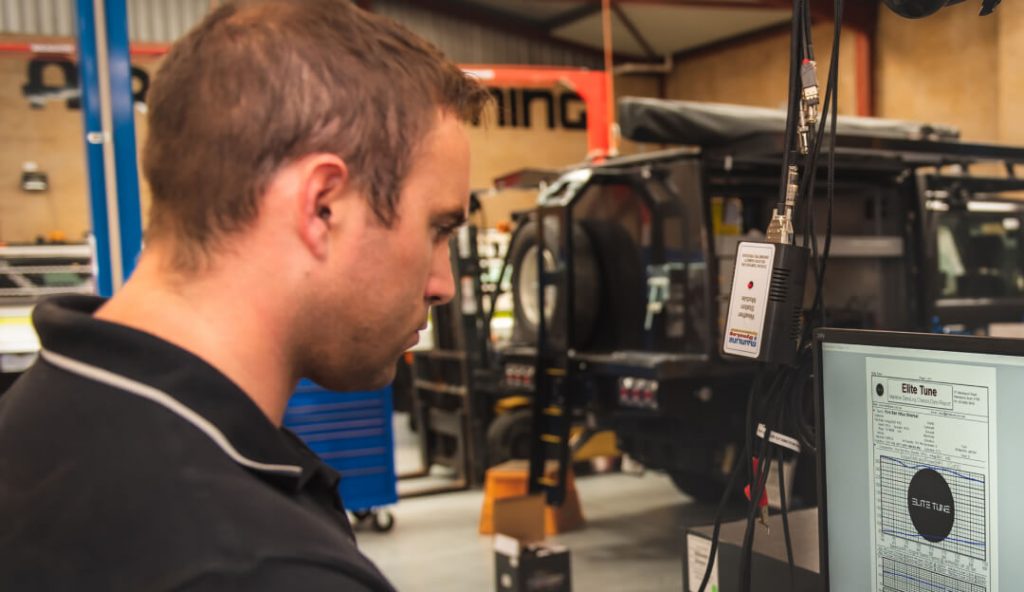ECU remapping and chip tuning are popular types of diesel tuning that can increase your 4×4’s power and performance.
As ECU remapping can be customised to your specific vehicle and goals, I always prefer ECU remapping to chip tuning.
Read on to learn the differences between ECU remap vs chip tuning and why I find ECU remapping to be the superior method.
Quick Summary
- ECU remapping alters the signals the ECU sends to your engine and can be used to enhance performance, torque, power, and overall driving experience while chip tuning adjusts existing hardware to boost power and performance
- Both ECU remapping for 4×4 vehicles and chip tuning can adjust the way an engine works to improve efficiency, performance, and power
- ECU remapping involves loading a custom map into your ECU based on your 4×4’s exact configuration. Chip tuning is limited to updates on existing hardware and cannot change software settings.
- The main difference between ECU remap vs chip tuning comes down to results — ECU remapping achieves more noticeable, reliable, long-lasting outcomes
- Choosing between ECU remap vs chip tuning comes down to overall goals and your specific vehicle.
- Both chip tuning and ECU remapping should always be performed by a tuning professional to minimise risks.
- When it comes to chip tuning vs ECU remap, I almost always recommend ECU remapping because it can be customised to your vehicle and offer superior results that last longer.
Chip Tuning vs ECU Remapping
Below, I’ve written a detailed comparison between chip tuning and ECU remapping, highlighting the key differences you need to know as well as pros and cons for each.
Taking all of this into account, ECU remapping comes out on top in most cases.
The Differences
Chip tuning offers quick, minor tweaks suitable for older cars but with limited customisation, while ECU remapping provides comprehensive, lasting upgrades, ideal for newer cars with personalised options for improved performance.
| Aspect | Chip Tuning | ECU Remapping |
|---|---|---|
| Method | Adjusts signals within existing hardware | Loading a map configured to the vehicle’s specifics |
| Software Changes | Does not create new programs or affect software | Alters the existing software programming |
| Results | Limited results and potential unreliable outcomes | Long-lasting, reliable performance boost |
| Reliability | Potential for sudden drops in performance or efficiency | Highly reliable with tailored results |
| Suitability | Sometimes adequate for older vehicle models | Recommended for almost all modern vehicles |
| Customisation | Limited to the confines of existing hardware | Customisable based on vehicle characteristics and user goals |
| Longevity | May see diminishing returns over time | Designed for sustainable, long-term improvements |
| Specialisation | Generic approach with standard modifications | Personalised to match specific goals, like towing power or handling |
Pros and Cons
Chip tuning improves a car’s speed and power with potential engine strain and warranty risks, while ECU remapping enhances performance and efficiency but may increase maintenance costs and requires professional installation.
| Modification Type | Benefits | Drawbacks |
|---|---|---|
| Chip Tuning |
|
|
| ECU Remapping |
|
|
Real Life Examples
I put together this mock scenario to help illustrate the real-life applications of an ECU remap vs chip tuning.
Chip Tuning vs ECU Remapping for a 2015 Ford Ranger XLT
Andrew has a 2015 Ford Ranger XLT with a 3.2L five-cylinder diesel engine and wants to improve his Ranger’s performance, particularly for towing and off-road driving.
| Comparison Criteria | Chip Tuning | ECU Remapping |
|---|---|---|
| Action | Equipped with a performance chip, altering fuel injection and turbo boost settings | Comprehensive adjustment of engine parameters, including fuel injection timing, air-to-fuel ratio, and turbocharger pressure |
| Immediate Results | Observable increase in power output, improved responsiveness under load | Noticeable improvement in power and torque, smoother and consistent performance |
| Shortcomings/Long-Term Benefits | Decreased fuel economy, occasional engine roughness, sporadic engine warning lights | Improved fuel efficiency, consistent performance over time without sporadic issues |
| Overall Assessment | Immediate performance boost but leads to operational inconsistencies and potential long-term issues | More holistic and sustainable improvement in performance, reliability, and efficiency |
FAQs
What is ECU remapping?
ECU stands for engine control unit. The ECU acts as a microprocessor that uses sensors to collect engine data.
I tell people to think of the ECU as the brain that controls their engine.
The ECU monitors and manages:
- The internal combustion of your vehicle
- Engine temperature
- Injection angle
- Oxygen concentration in exhaust gases
- Fuel injection pressure
- Fuel dosing
ECU remapping, also known as ECU tuning, is an upgrade that involves adjusting the ECU’s software. The result is a noticeable increase in a vehicle’s power and performance.
With its ability to increase torque output and power without a huge vehicle overhaul, ECU remapping is a popular upgrade among 4×4 enthusiasts.
By modifying the commands the ECU gives to the engine, custom values and coding input can be added to maximise a vehicle’s potential.
Learn More: Discover the Benefits of ECU Remapping for Your 4×4 Vehicle
What is chip tuning?
Chip tuning can alter existing hardware and adjust signals that change how your engine runs. Manipulating these values and sensors can boost power and performance.
Benefits of chip tuning include:
- Improved performance
- A boost in power
- Higher top speed
- Improved engine efficiency
- Faster acceleration
While chip tuning can offer benefits, they are often unpredictable and short-lived. Chip tuning can only alter existing hardware and doesn’t affect the engine’s software.
Since chip tuning doesn’t actually create new ECU settings, any improvements will be minimal. Chip tuning also lacks the customisation that can be done with ECU remapping.
How do ECU Remapping and Chip Tuning differ in terms of vehicle compatibility?
I find that ECU remapping is suitable for most modern vehicles equipped with an ECU. Chip tuning is generally used for older models that have a removable chip in the ECU.
What are the performance benefits of ECU Remapping and Chip Tuning?
Both methods aim to improve engine performance, including increased horsepower, torque, and better fuel economy. However, the extent of improvement can vary based on the vehicle and the quality of tuning.
I always recommend ECU remapping as the superior choice because of the ability to customise the adjustments based on a vehicle’s make, model, and the owner’s goals.
Are there any risks associated with ECU remapping and chip tuning?
Yes, there are risks involved with both processes, including:
- Potential voiding of vehicle warranty
- Increased strain on engine components, especially if the tuning is not done properly
- Potential legal implications depending on the region’s vehicle modification laws
What is the difference between dyno tuning and ECU remapping?
In dyno tuning, we use an advanced tool called a dynamometer to simulate varying road conditions and evaluate how your 4×4 performs in these scenarios. The diagnostic testing used in-house dyno tuning can reveal issues with your engine’s performance, including fuel efficiency, horsepower, torque, air-to-fuel ratio, and overall function.
Detecting these issues allows our professional tuners to pinpoint areas where your 4×4’s performance can be improved. The benefits of dyno tuning can be a great complement to ECU remapping. Using these technologies together, we can create the ultimate plan to get the most out of your 4×4.
Can ECU remapping and chip tuning be reversed?
ECU remapping can often be reversed by reprogramming the ECU to its original settings. In contrast, chip tuning, involving physical modifications, may not be as easily reversible.
How do I choose between ECU Remapping and Chip Tuning?
Choosing between chip tuning vs ECU remap depends on your vehicle’s make and model, desired outcomes, and the availability of professional services. Modern vehicles are more likely to benefit from ECU remapping, whereas older vehicles might require chip tuning. When a client comes in with a modern 4×4 and they’re looking to optimise its performance, I recommend ECU remapping.
How do I know if I need ECU remapping?
I recommend asking yourself these questions to determine if you may benefit from ECU remapping:
- Is my car using more fuel compared to when I first bought it?
- Does my vehicle struggle to accelerate?
- Does my 4×4 seem less powerful than when I first got it?
- Do I want improved maneouverability and control?
- Has my 4×4 been sluggish lately?
Can I ECU Remap Myself?
Yes. Do I recommend it? Absolutely not.
I’ve seen many 4×4’s damaged by DIY remapping attempts. Amateur ECU remapping or chip tuning is just not worth the safety risk and potential engine damage.
Both ECU remapping and chip tuning should be performed by tuning professionals to minimise risks and ensure optimal performance gains.
How does ECU Remapping affect engine longevity?
While remapping can improve performance, it may also put additional strain on engine components, potentially affecting longevity if not done properly.
Are there legal considerations to keep in mind with these tuning methods?
Yes, vehicle modifications, including ECU remapping and chip tuning, can have legal implications such as affecting emissions standards. It’s important to check local regulations before proceeding with any engine upgrades.
What is the ECU remapping process like?
Here’s what I tell customers to expect during an ECU upgrade:
- One of our professional tuners will analyse your car and discuss your goals with you to determine whether you’ll benefit most from ECU remapping or chip tuning.
- Before the upgrade, a technician will perform an extensive vehicle check-up to make sure the oil and fluid levels are correct and to detect and address common issues.
- The technician will complete your upgrade, ensuring it is tailored to your vehicle and goals to get you the best results. Your engine will be monitored throughout the upgrade.
- Your tuning technician will test your engine, including a road test, to ensure everything is running smoothly.
Conclusion
When it comes to chip tuning vs ECU remap, I almost always recommend ECU remapping to clients.
ECU remapping for 4×4 vehicles is an effective way to improve performance, efficiency, and overall driving experience, especially for aggressive driving or off-road conditions.
As opposed to chip tuning, ECU remapping can be customised according to your desired outcome and vehicle, ensuring the best results.

